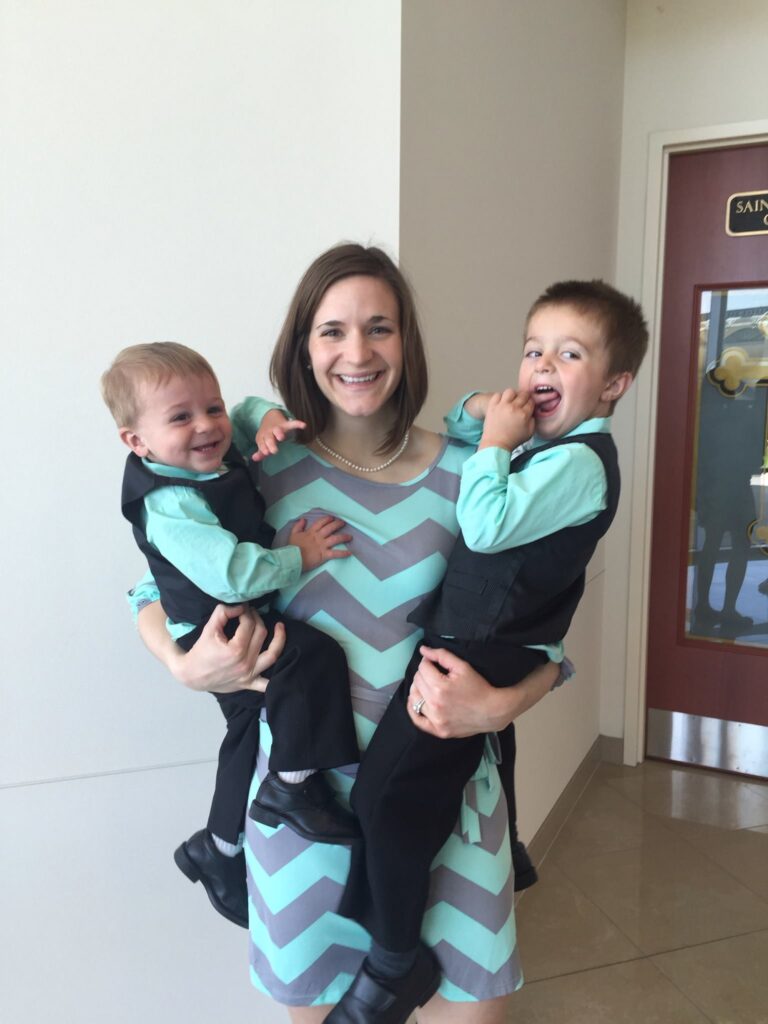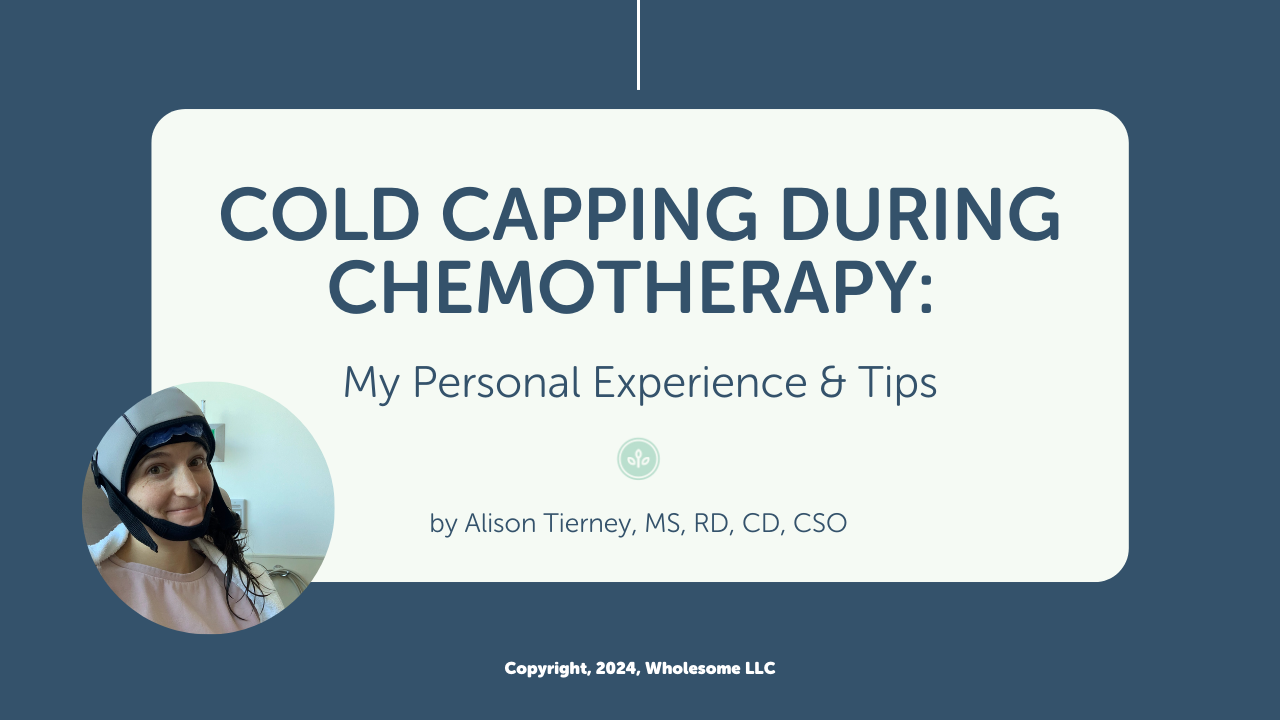The Wholesome Journey - Group Nutrition Coaching Program
Mentorship Program, 1:1 Nutrition Coaching with Alison
What do you want to learn more about?
Program Login
Podcast Features
February 16, 2018
Alison Tierney, MS, RD, CD, CSO
Alison is a registered dietitian, board-certified in oncology nutrition, and a cancer thriver. Her expertise in oncology nutrition and personal experience with her own cancer diagnosis and its treatment provide her with the unique perspective of being able to relate to her clients on an entirely different level. Her content is consistently focused on evidence-based guidelines and seeks to increase the awareness of the power of nutrition to complement traditional cancer therapies.
- Alison Tierney, MS, RD, CD, CSO
- Alison Tierney, MS, RD, CD, CSO
- Alison Tierney, MS, RD, CD, CSO
- Alison Tierney, MS, RD, CD, CSO
- Alison Tierney, MS, RD, CD, CSO
- Alison Tierney, MS, RD, CD, CSO
- Alison Tierney, MS, RD, CD, CSO
- Alison Tierney, MS, RD, CD, CSO
- Alison Tierney, MS, RD, CD, CSO
- Alison Tierney, MS, RD, CD, CSO
- Alison Tierney, MS, RD, CD, CSO
- Alison Tierney, MS, RD, CD, CSO
- Alison Tierney, MS, RD, CD, CSO
- Alison Tierney, MS, RD, CD, CSO
- Alison Tierney, MS, RD, CD, CSO
- Alison Tierney, MS, RD, CD, CSO
- Alison Tierney, MS, RD, CD, CSO
- Alison Tierney, MS, RD, CD, CSO
- Alison Tierney, MS, RD, CD, CSO
- Alison Tierney, MS, RD, CD, CSO
- Alison Tierney, MS, RD, CD, CSO
- Alison Tierney, MS, RD, CD, CSO
- Alison Tierney, MS, RD, CD, CSO
- Alison Tierney, MS, RD, CD, CSO
- Alison Tierney, MS, RD, CD, CSO
- Alison Tierney, MS, RD, CD, CSO
- Alison Tierney, MS, RD, CD, CSO
- Alison Tierney, MS, RD, CD, CSO
- Alison Tierney, MS, RD, CD, CSO
- Alison Tierney, MS, RD, CD, CSO
- Alison Tierney, MS, RD, CD, CSO
- Alison Tierney, MS, RD, CD, CSO
- Alison Tierney, MS, RD, CD, CSO
- Alison Tierney, MS, RD, CD, CSO
- Alison Tierney, MS, RD, CD, CSO
- Alison Tierney, MS, RD, CD, CSO
- Alison Tierney, MS, RD, CD, CSO
- Alison Tierney, MS, RD, CD, CSO
- Alison Tierney, MS, RD, CD, CSO
- Alison Tierney, MS, RD, CD, CSO
- Alison Tierney, MS, RD, CD, CSO
- Alison Tierney, MS, RD, CD, CSO
- Alison Tierney, MS, RD, CD, CSO
- Alison Tierney, MS, RD, CD, CSO
- Alison Tierney, MS, RD, CD, CSO
- Alison Tierney, MS, RD, CD, CSO
- Alison Tierney, MS, RD, CD, CSO
- Alison Tierney, MS, RD, CD, CSO
- Alison Tierney, MS, RD, CD, CSO
- Alison Tierney, MS, RD, CD, CSO
- Alison Tierney, MS, RD, CD, CSO
- Alison Tierney, MS, RD, CD, CSO
- Alison Tierney, MS, RD, CD, CSO
- Alison Tierney, MS, RD, CD, CSO
- Alison Tierney, MS, RD, CD, CSO
- Alison Tierney, MS, RD, CD, CSO
- Alison Tierney, MS, RD, CD, CSO
- Alison Tierney, MS, RD, CD, CSO
- Alison Tierney, MS, RD, CD, CSO
- Alison Tierney, MS, RD, CD, CSO
- Alison Tierney, MS, RD, CD, CSO
- Alison Tierney, MS, RD, CD, CSO
- Alison Tierney, MS, RD, CD, CSO
- Alison Tierney, MS, RD, CD, CSO
- Alison Tierney, MS, RD, CD, CSO
- Alison Tierney, MS, RD, CD, CSO
- Alison Tierney, MS, RD, CD, CSO
- Alison Tierney, MS, RD, CD, CSO
- Alison Tierney, MS, RD, CD, CSO
- Alison Tierney, MS, RD, CD, CSO
- Alison Tierney, MS, RD, CD, CSO
- Alison Tierney, MS, RD, CD, CSO
- Alison Tierney, MS, RD, CD, CSO
- Alison Tierney, MS, RD, CD, CSO
- Alison Tierney, MS, RD, CD, CSO
- Alison Tierney, MS, RD, CD, CSO
- Alison Tierney, MS, RD, CD, CSO
- Alison Tierney, MS, RD, CD, CSO
- Alison Tierney, MS, RD, CD, CSO
- Alison Tierney, MS, RD, CD, CSO
- Alison Tierney, MS, RD, CD, CSO
- Alison Tierney, MS, RD, CD, CSO
- Alison Tierney, MS, RD, CD, CSO
- Alison Tierney, MS, RD, CD, CSO
- Alison Tierney, MS, RD, CD, CSO
- Alison Tierney, MS, RD, CD, CSO
- Alison Tierney, MS, RD, CD, CSO
- Alison Tierney, MS, RD, CD, CSO
- Alison Tierney, MS, RD, CD, CSO
- Alison Tierney, MS, RD, CD, CSO
- Alison Tierney, MS, RD, CD, CSO
- Alison Tierney, MS, RD, CD, CSO
- Alison Tierney, MS, RD, CD, CSO
- Alison Tierney, MS, RD, CD, CSO
- Alison Tierney, MS, RD, CD, CSO
- Alison Tierney, MS, RD, CD, CSO
- Alison Tierney, MS, RD, CD, CSO
- Alison Tierney, MS, RD, CD, CSO
- Alison Tierney, MS, RD, CD, CSO
- Alison Tierney, MS, RD, CD, CSO
- Alison Tierney, MS, RD, CD, CSO
- Alison Tierney, MS, RD, CD, CSO
- Alison Tierney, MS, RD, CD, CSO
- Alison Tierney, MS, RD, CD, CSO
- Alison Tierney, MS, RD, CD, CSO
- Alison Tierney, MS, RD, CD, CSO
- Alison Tierney, MS, RD, CD, CSO
- Alison Tierney, MS, RD, CD, CSO
- Alison Tierney, MS, RD, CD, CSO
- Alison Tierney, MS, RD, CD, CSO
- Alison Tierney, MS, RD, CD, CSO
- Alison Tierney, MS, RD, CD, CSO
- Alison Tierney, MS, RD, CD, CSO
- Alison Tierney, MS, RD, CD, CSO
- Alison Tierney, MS, RD, CD, CSO
- Alison Tierney, MS, RD, CD, CSO
- Alison Tierney, MS, RD, CD, CSO
- Alison Tierney, MS, RD, CD, CSO
- Alison Tierney, MS, RD, CD, CSO
- Alison Tierney, MS, RD, CD, CSO
- Alison Tierney, MS, RD, CD, CSO
- Alison Tierney, MS, RD, CD, CSO
- Alison Tierney, MS, RD, CD, CSO
Infertility.
I don’t know about you, but I hear this word more and more these days. Actually, I hear it too much. Perhaps it is because I am personally more aware of infertility itself as we—my husband and I, and several of my close friends and family members—experienced (and continue to deal with) the unfortunate and devastating challenge of trying to conceive. At first, I wasn’t very open about sharing our infertility journey; it’s so personal for not only the woman, but for her husband too. However, over time, I realized that I needed to share my experience. What if it could help others—even just one couple—hold, snuggle, and kiss their new baby, and cry the happy tears of joy the moment their beautiful child is born? That is why I am sharing my story. But each couple’s journey is different. This is our story, but I hope you can recognize yourself in it if you too are struggling, and know that you are not alone. My goal is to give you and your spouse hope, to provide another avenue of possibility to experience not only holding that positive pregnancy test in your hands but to someday hold your healthy, beautiful baby in your arms.
From the moment I officially hit puberty and got my first period, I was never regular. I’d get it for two weeks at a time and then not again for maybe five months. I’m pretty sure I never had it 28 days after my previous. At first, it sounds nice. No period for five months, or worrying about cramps? Jackpot. But then those two weeks of heavy bleeding would come and it was awful. As I got older, I started to understand that this was not normal or healthy for me.
Late in my teens, after some discussion with my doctor about several different options, I was put on the Pill to help regulate my cycle. Honestly, it wasn’t an easy decision for me. Because of my faith, birth control wasn’t something I ever thought I would pursue. I worried that others might judge me for being on it or make assumptions. And you know what? People did. But I knew, deep down, what the medication was being used for and what it was not being used for. I didn’t—and shouldn’t—have to explain that to anyone.

Several years later, my husband, Patrick, and I were ready for a family. We had finally completed our education, were both blessed with good and stable jobs, and had purchased our home, ready to be filled with children. My doctor had “warned” me that I would be more fertile during the first month after I stopped taking the Pill and that our chances of having twins would increase. And, given that I am twin, the likelihood was even higher. Even though I didn’t pray to have twins for our first pregnancy, Patrick and I decided we weren’t concerned. Most of all, we were a little nervous about what would happen with my cycle considering what it was like before the Pill. We decided we would happily take the risk if God chose that path for us.
Months passed. Still no period.
I had been learning the process of “natural family planning,” or NFP, to help understand when ovulation was occurring. After months of charting my temperature and tracking other cycle-related signs and symptoms, I shared the data with my doctor. She reviewed it and told me there was nothing we could glean from it. Nothing was consistent. The data was not following any sort of trend. It was frustrating, to say the least. Not too long after that appointment I was officially diagnosed with PCOS, or polycystic ovarian syndrome.
I wasn’t surprised by the diagnosis. After all, other close family members had been diagnosed before me, and I had other symptoms besides the cycle irregularity and infertility—acne, unwanted hair growth, etc.
Have you ever experienced going to the doctor for something simple, such as a sore throat, and not that you wanted a strep diagnosis, but were relieved when you finally knew what was wrong? Finally had an answer to why your throat hurt so much? Finally had the answer that would help you move beyond the sore throat and treat the issue (i.e., with antibiotics)?
Yeah. Well, the PCOS diagnosis wasn’t like that for me. It was more like, “Bummer, dude. You have PCOS. Sorry, we don’t have many answers to this unusual hormone disturbance or tools to help overcome it.” Luckily, my doctor didn’t break the news that way. That was my inner self talking. Instead, my doctor (who unfortunately has battled her own infertility) was ready to attack it full force.
The first course of action was metformin. Metformin is one of the first lines of treatment for prediabetes, type 2 diabetes, and PCOS. I don’t plan on discussing the details of PCOS here, but the important point is that PCOS is related to hormone imbalances. Metformin helps lower blood sugars in individuals with type 2 diabetes, ultimately making insulin (a hormone) more sensitive, or effective. With PCOS, when one hormone is out of balance, then others become out of balance—thus disrupting many of the hormones related to women’s health and fertility.

To be honest, I wasn’t sure how metformin was going to help me. I was at a healthy weight, my blood glucose numbers always came back great in past blood draws, and I actually responded to carbohydrates really well. Despite this, I reluctantly started the metformin. Unfortunately, metformin can cause some unfavorable side effects, specifically gastrointestinal-related symptoms. Thankfully, I escaped any of those side effects. But after several months, including an appointment that ultimately led to “let’s wait a few more months,” nothing happened. No period. No positive ovulation test.
I never thought I would pray so much for a period!
Throughout that first year of trying to conceive, I really struggled as I watched others around me get pregnant. Don’t get me wrong, I was so incredibly happy for them, but at the same time I was jealous. I didn’t understand (and still don’t) why it’s so difficult for many couples who would be amazing parents to conceive, while so many get pregnant without even trying and some without wanting to have children in the first place. I kept trying to remind myself that God had a plan for us. I prayed for peace, comfort, and strength to know God had something up His sleeve.
Patrick was nothing short of incredible throughout the journey. Besides, this was his journey too—our journey. But I felt as though it was all my fault. It was my body that wasn’t cooperating. I foolishly would ask him, “If I can’t give you children, will you still love me?” He held me. He let me cry. We cried together. He stayed calm and understanding, even when I would get frustrated, fed up, angry, and upset at another negative ovulation test.

I truly had the support of him and the few others I included in our journey. But what hurt the most was when people would say things such as: “You’re thinking too much about it.” “It will happen when you stop trying.” Seriously? If you know someone who is struggling with infertility, please do not tell them they’re overthinking it.
My doctor hit this nail on the head. I told her about the comments and how I was trying hard not to think too much. I was obviously letting others’ well-meaning but unhelpful advice get to me. My doctor stopped me and said, “Alison, you will never stop thinking about it. You essentially live in two-week increments.” She was referring to constantly hoping for ovulation, pregnancy, or at least a period every two weeks. She was right. When you are dealing with infertility, you never stop thinking about it.
After more time passed, we decided we would be more aggressive with treatments. Despite my continued reluctance to use more medication, we truly wanted a baby and I fully trusted my doctor. Since I wasn’t having a period, the first step was to jump-start it with a new medication. I would then expect my period and take a second medicine to induce ovulation. This process led to more calendars and more counting of days. Together, we decided we would try it for three cycles. If pregnancy did not result, my doctor told me she would then refer me to a specialist. I didn’t even want to think about the next steps. It wasn’t that I was against IVF treatments, I just wasn’t ready for them and didn’t think I would be if the current plan led to three failed cycles. But what else could I do? It was time for some research.
Head over [here] to continue and read chapter 2 of our infertility story.
Infertility and How We Overcame It, Chapter 1
Leave a Reply Cancel reply
Featured Articles
Wholesome LLC is not a medical practice, and its employees cannot offer medical advice. This website provides educational information but it is not a substitute for medical advice from a licensed medical professional who is familiar with your particular facts and circumstances. The information contained on this website is not intended to diagnose, treat, or cure any disease and shall not be construed as medical advice. The information and education on this website is provided for you to use at your own discretion.
You can further review our disclaimer here.
Wholesome
About Alison
Courses & Programs
The Wholesome Journey
Free Resources
FAQs
Press & Media
Recipes
Blog
Contact Us
Shop
© 2026 Wholesome, LLC All rights reserved.
Privacy Policy
Terms of Use
Disclaimer
Mobile Terms of Service



Be the first to comment